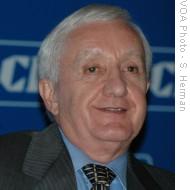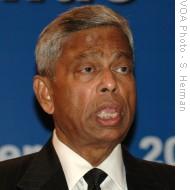voa标准英语2008年-India, US Discuss Practicalities of Implementin(在线收听)
A month after their historic deal on civil nuclear cooperation was finalized, Indian and Americans officials and nuclear industry executives are trying to figure out the next step.
That was the topic of discussion here Friday at an industry session on cooperation between India and the United States regarding nuclear energy. Participants agreed that among the major challenges in building more atomic power plants in India are overcoming the shortages of equipment suppliers and nuclear engineers.
 |
| Dale Klein |
The head of the U.S. Nuclear Regulatory Commission, Dale Klein, says both countries will be working together to overcome those hurdles.
"Both the U.S. industry and the industry in India need to solve both of those aspects - both the equipment and the people," he said. "I think the U.S. can certainly help India in terms of sharing technologies that have worked well in the academic arena. We can look at sharing joint curricula and we can also learn from how India does its educational program, so it's a two-way street."
The deal, which removed New Delhi from decades on the international nuclear blacklist, allows the United States to supply India with nuclear fuel, reactors and other components to expand its civil atomic power industry.
India was ostracized for carrying out nuclear weapons tests and not signing international accords on limiting the spread of such weapons.
India only has 17 civil nuclear plants, supplying less than three percent of the country's electrical power generation. Experts say India will need up to 700,000 more megawatts of electricity by the year 2030 for its booming economy.
 |
| Syamal Gupta |
The chairman of one of India's prominent companies in the nuclear industry, Syamal Gupta of TCE Consulting Engineers, says the nuclear deal will have high-tech "spinoff effects" beyond atomic technology.
"India also stands to gain out of this civil nuclear deal in terms of cooperation between the two countries in advanced computing, weather forecasting, avionic systems for civil aircraft, components for remote testing, commercial satellite systems, medical and bio-tech."
U.S. and Indian government and industry officials are cautioning that, despite the landmark deal, American nuclear technology does not have an inherent advantage penetrating India's nascent civil atomic market. French and Japanese companies will also be competitors. And experts say China is likely to become an exporter of reactor technology in a few years.